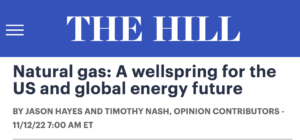US/Europe Energy Policies and Exports
A November 12 article in The Hill explains why: Natural gas: A wellspring for the US and global energy future. For students advocating energy policy reforms, natural gas provides reliable, inexpensive, and clean energy now as well as provides backup support for intermittent wind and solar energy sources.
For green energy advocates the best can be the enemy of the good. As natural gas continues to substitute for more-polluting coal, US and European policies that restrict natural gas will increase less-clean coal burning for energy and increasepollution.
Expanding natural gas use has for decades helped power the U.S. and clear the air:

That fuel-switching from older coal plants to newer natural gas generation is a key reason that American “greenhouse gas emissions in 2020 … were 21 percent below 2005 levels.” Improved generation technologies are also why we’ve been able to decrease combined emissions of six criteria air pollutants by 78 percent from 1970 to 2021.
Natural gas: A wellspring for the US and global energy future (The Hill, November 12, 2022)
European countries, especially Germany, became dependent on natural gas from Russia as they subsidized wind and solar energy. This is now a bigger problem following the Russian invasion of Ukraine. Had European countries allowed natural gas exploration and production under their own lands, and also allowed more port facilities for LNG (Liquified Natural Gas) imports, energy prices for homes and businesses would be far lower.
Environmentalists wishing for wind and solar to power modern industrial economies have opposed natural gas. Though the shock of the Russian gas shut off is changing public views on natural gas exploration and development, European government energy and environmental policies still pose obstructions.
Though the U.S. cannot make European countries change their energy and environmental policies, US policymakers can reduce obstructions to U.S. natural gas transportation and exports to Europe. The New York Times reports: E.P.A., Reversing Trump, Will Restore States’ Power to Block Pipelines (NYT, June 2, 2022) and a 2021 story PennEast becomes the latest to scuttle a natural gas pipeline project, reports:
PennEast Pipeline said on Monday it would stop developing a proposed pipeline from Pennsylvania to New Jersey, the latest in a series of natural gas lines to run aground due to legal and regulatory challenges.
The project was one of several started in recent years to draw gas from the fast-growing Appalachian region, only to run into local or environmental opposition to more fossil-fuel infrastructure. Gas prices have surged in Europe and Asia due to rising demand and lack of supply, and that has boosted U.S. gas prices to seven-year highs.
Jason Hayes and Timothy Nash, writing in The Hill, explain why European countries now desperately need the natural gas from deep under Pennsylvania that could have been flowing to LNG facilities along the New Jersey coast:
In Europe, green policies aimed at reducing domestic natural gas production have helped to create an energy crisis that is hobbling the continent’s industrial and manufacturing capacity. The European Union is dependent on Russian natural gas exports, and several European nations are considering reopening coal plants to keep from freezing this winter.
This Izzit.org video contrasts energy policies and realities in Germany vs. Pennsylvania. One allows natural gas to be discovered, extracted, and transported; the other cuts down forests to expand coal mining. Energy Solutions: Who Chooses? – Full Video
